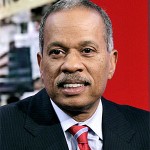Williams' Mistake: Starting a Real Dialogue
 The next time someone tells you he wants a conversation about race or poverty or Islam what he really means is “I'll spout the PC line and you agree with me.”
The next time someone tells you he wants a conversation about race or poverty or Islam what he really means is “I'll spout the PC line and you agree with me.”
Much ink has been and will be spilled over Juan Williams’ firing from NPR after his comments about Muslims. To wit, Williams (author of several books on the civil rights movement) admitted that he sometimes feels “nervous” when he sees people in Muslim garb on airplanes. He cited this while discussing statements of Faisal Shahzad, the Pakistani-American who pleaded guilty to attempting to detonate a bomb in Times Square.
"He said the war with Muslims, America's war is just beginning, first drop of blood. I don't think there's any way to get away from these facts," said Williams.
He was then axed from his analyst (not reporter) job at NPR.
Cue the predictable reactions: the Right hates NPR already (a GOP Hill aide friend of mine used to call it “National Proletariat Radio”), so they smell a PC conspiracy and want NPR defunded, whereas the Left cannot imagine Williams’ words to have been anything other than verbal nuclear weapons hurled at social justice and religious tolerance.
This whole thing is exhausting. But in even better news, it does highlight something hugely depressing about dialogue in America.
Very earnest people in academia, the media, and government are everywhere and always telling us we need “a conversation” about this or that—one day it is race, the next it is about the poor, maybe the Palestinian cause another day. I remember in 2008 that, for them, Barack Obama’s election wasn’t an occasion for a brief reflection and celebration that African-Americans have come so very far from days not too distant—it was merely a sorta hopeful sign that we will now finally have that much-needed conversation about race in this country.
And, believe it or not, all that is really quite fine by me. Why the heck not use the 2008 election as a time to talk about race?
But here is where we get back to old Juan Williams. For conversations to be genuine, each side has to be patient and assume good faith with his or her interlocutor unless proved otherwise so that all parties can speak freely. What Williams expressed was not a sign of irretrievable bigotry: human beings react emotionally sometimes in ways that don’t reflect even their most dearly-held beliefs, and after 9/11, it isn’t unthinkable that one may have a gut reaction like his at seeing a self-identifying Muslim on a plane.
So here’s the depressing part: talking freely can mean admitting some things that might not be popular or that you might not even like about yourself so long as it means getting to the real issues at hand, ugly warts and all. Otherwise, all you’re doing is unproductive nice-talk that never moves the ball down the field. But instead at NPR, Williams loses his job for expressing an emotion outside of the modern racial orthodoxy. And don’t bother looking for the conversation-fetishists out there to rise in support of Williams.
So, the next time some elbow-patched community college professor gets on TV and tells you he wants “a conversation” about Islamic-American relations, chances are he really means, “I want to spout off the standard PC line, and I want you to shut up and agree with me.”
Don’t believe me? Just ask him if he thinks Juan Williams should be collecting unemployment.